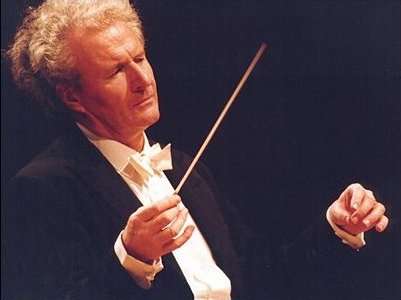|
Back
The Passionate Patriarch New York
Avery Fisher Hall, Lincoln Center
12/09/2010 - & December, 10, 11*, 2010
Sir Edward Elgar: Introduction and Allegro for Strings, Opus 47 – Violin Concerto in B Minor, Opus 61
Wolfgang Amadeus Mozart: Symphony No. 36 in C Major “Linz”, K. 425
Nikolaj Znaider (Violin soloist), Elgar String Quartet: Glenn Dicterow, Mark Ginsberg (Violins), Rebecca Young (Viola), Eric Bartlett (Cello)
New York Philharmonic Orchestra, Sir Colin Davis (Conductor)

Sir C. Davis (© Photo Sessner)
Novelist Peter De Vries once depicted a theater critic who had only one rule. The more he laughed, sobbed, fell in love with or became emotionally involved in a play, the more ferociously he trashed it.
Sir Edward Elgar was like that, especially for his fellow British music critics. His music is lush, emotive, suitably romantic, somewhat aristocratic, and always so moving that “serious” writers could never take him seriously. (Even Beecham said it reminded him of railroad station architecture!) It was bad enough that the Pomp and Circumstance marches became a standard for graduation classes, but the fact that the masses loved his choral works was enough to make the more right-thinking thinkers sigh disdainfully.
Fortunately, the best British conductors–including Sir Colin Davis, of course–reveled in Elgar. Except for some of the more salon-ish chamber music, nothing was not to like about the music. And with several pairs of singular connections during the New York Philharmonic concerts this past week, the Elgar came out with singular attraction.
For one thing, Sir Colin is hardly a stranger to this orchestra. During his 83 years, he has not only endeared himself to the orchestra many times, but was principal Guest Conductor between 1998 and 2003. With its many idiosyncratic conductors over the years, Sir Colin comes across with clarity and lucidity, as well as giving a close look to how 20th Century composers wanted their music to be played.
Thus, in the opening Introduction and Allegro, Sir Colin had old friends as the string quartet, Glenn Docterow, of course, and three other major players in the strings. Moreover, Sir Colin made the strings of the New York Philharmonic sing with all the lush grandiosity which this music needs to come alive. Elgar isn’t played too frequently in New York, but anything less than the most succulent juicy sounds detracts from Elgar’s version of the concerto grosso.

N. Znaider (© Nikolaj Znaider)
Another connection–an exceptional one–was found in the Violin Concerto.. The Polish-Israeli, Danish-born Nicolaj Znaider performed on the same 1741 Guarneri violin previously played by the legendary violinist Fritz Kreisler. And while many listeners associate the Elgar concerto with Yehudi Menuhin, it was written for and dedicated to Kreisler.
I don’t know if he premiered this piece on the same violin, but it seems likely. Which means that the sound we heard was the same sound which Elgar heard when he conducted the premiere in 1910.
Though I can’t imagine anyone playing this with more sweep, more fire, and less sentimentality than young Mr Znaider. The artist is more than a fiddler: he is now associate conductor of the Mariinsky Orchestra under Valery Gergiev, so obviously knows musical structure as well as violin technique.
The result was a performance which caressed, jolted, and above all, was a heartfelt performance. Having studied in Russia, Mr. Znaider plays the Elgar like he would the Tchaikovsky Violin Concerto. It was all-out fiddling, without a moment of thought that this was anything but one of the great concertos of the 20th Century.
Whether one could classify it with more cerebral works, like Berg’s, was inconsequential. This was a ravishing performance.
In the center of the concert. Sir Colin played Mozart’s “Linz” Symphony. The Phil never sounded better, the conductor–never the showboat, but still using the score after all these decades–played Mozart the way the best British conductors play Mozart. With passion, control, and the challenge of allowing a large orchestra to play Mozart for the most imposing effects.
Harry Rolnick
|